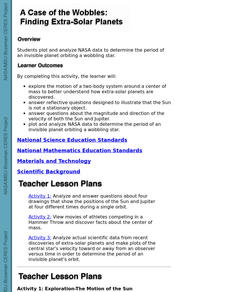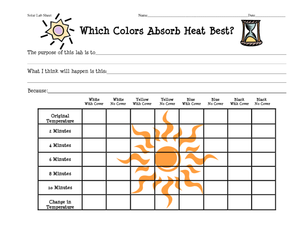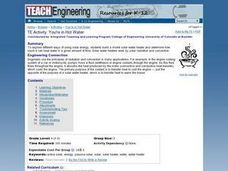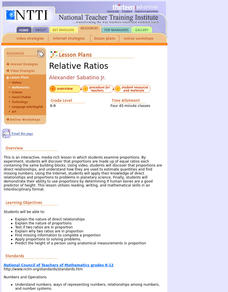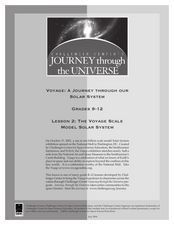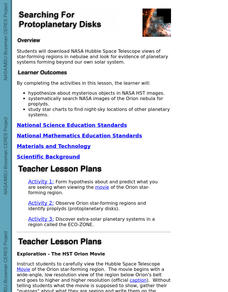Baylor College
People and Climate
Model how the sun's energy strikes the planet and help your class relate it to a climate map. Assign small groups an individual climate zone to discuss. They reflect on and research how humans survive in the assigned climate and write a...
Baylor College
What Is the Water Cycle?
Small groups place sand and ice in a covered box, place the box in the sunlight, then observe as evaporation, condensation, and precipitation occur. These models serve as miniature water cycles and demonstrations of the three phases of...
Curated OER
Finding Extra-Solar Planets
Students plot and analyze NASA data to determine the period of an invisible planet orbiting a wobbling star. They explore the motion of a two-body system around a center of mass to better explain how extra-solar planets are discovered.
Curated OER
ENERGY, Design Competition: Energy Systems of the Future!
Students examine energy, where it comes from and the different fuels that are used. In this energy lesson students design an energy infrastructure using a renewable energy source.
Curated OER
Spacing Out the Solar System
Sixth graders practice applying their problem-solving skills as they measure circular objects and make connections to planets. They identify and describe measurable attributes of objects and units of measurement and solve problems...
Curated OER
Cooking with the Sun!
Students access prior knowledge of solar energy and understand that solar energy produces heat. In this solar cooker lesson, students complete grade appropriate experiments using the heat of the sun. Students complete a worksheet on...
Curated OER
TE Activity: You're in Hot Water
Students study different ways of using solar energy. They design a solar water heater and determine how much water it can heat in a set amount of time. They examine how the heaters work by solar radiation and convection.
Teach Engineering
Maximum Power Point
Investigate the maximum power output of a photovoltaic panel with a lesson that introduces the class to the maximum power point. Individuals learn how to determine the maximum power point of a solar panel by using Ohm's law and the power...
Curated OER
The Battle for Ultimate Power
Middle schoolers gain an understanding of how the powers of 10 and scientific notation can be used to represent the scale of things in the universe. They relate the number of stars in the universe to the number of grains of sand on...
Teach Engineering
The Amazing Red Planet
Introduce your class to Mars with a resource that provides information about its size, location, length of day, length of year, number of moons, and average temperature. Also includes is information about the lans for past and future...
Teach Engineering
Photosynthesis—Life's Primary Energy Source
Wouldn't it be great if you could produce your own food? Scholars learn about the processes of photosynthesis and cellular respiration in plants. They consider how to use photosynthesis as a model of an efficient system and how to apply...
Curated OER
Relative Ratios
Students discover that proportions are made up of equal ratios each containing the same building blocks. They, using the Internet, apply their knowledge of direct relationships and proportions to problems in planetary science.
Curated OER
Ellipses and Kepler's First Law
The class examines graphs in the form r = F(¿¿) in polar coordinates (r, ¿¿), in particular with the circle, ellipse and other conic sections. They determine the nature of an ellipse by studying the role of the semimajor axis and...
Curated OER
Make a Sundial
Students explore space science by conducting a sun experiment in class. In this time telling lesson, students discuss how the sun sits in our sky at exact times each day and how astronomy is based on our perspective of the solar system....
Mascil Project
Closed Greenhouses
Controlling the efficiency of a greenhouse is a mathematical task. A collaborative project challenges learners to create an efficiency plan for a closed greenhouse. Using algebraic equations, they consider a set of constraints, design...
Curated OER
Walk a Mile in your Orbit
Students create an awareness of the distance between the planets and the complexity of the solar system through a model of an active solar system. they incorporate physical education and math with the ability to convert distances of each...
Curated OER
The Voyage Scale
Students identify how models are powerful tools of exploration and that the sizes of the planets and distances between the planets in the Solar System span a large range. They make a sign for each planet they have created in the lesson...
Curated OER
Scientific Notation
Middle schoolers explore the concept of expressing numbers in scientific notation. In this scientific notation lesson, students understand the importance of using scientific notation by finding real world examples where scientific...
Curated OER
99.86% - Measuring Our Sun's Mass
Students determine just how large the sun is. In this solar system lesson, students follow the prescribed steps to draw a box that represents the size of the sun and its mass compared to the entire solar system.
Curated OER
Searching For Protoplanetary Disks
Learners download NASA Hubble Space Telescope views of star-forming regions in nebulae and look for evidence of planetary systems forming beyond our own solar system. They hypothesize about mysterious objects in NASA HST images.
Curated OER
Distance in Space
Sixth graders explore space science by measuring distances between planets. In this solar system lesson, 6th graders view a Bill Nye video and discover the conversion between the metric system and imperial measuring systems. Students...
Curated OER
In a Galaxy Far, Far, Far Away
Sixth graders compare distances between objects in the solar system. They investigate how light years are measured and when using them to measure how distances compare with one another. They write an essay exploring the possibility of...
Curated OER
Unit 2 Sun & Stars
Young scholars describe stellar objects using terms such as stars, planets, satellites, orbits and light. In this sun and stars unit, students research stellar objects through seven individual lessons discovering star characteristics,...
Curated OER
How Big Are Earth, Sun, and Moon?
Third graders draw what they believe is in space on a dry erase board. In groups, they are given a beaker half filled with water and they add a teaspoon of oil, observing the different layers that form. To end the lesson, they identify...
Other popular searches
- Solar System Math Lessons
- Solar System Math Graph
- Solar System Math Age
- Solar System Math Ration
- Solar System Math Lessons'
- Solar System Math Worksheets
- Math Solar System
- Math Science Solar System
- Math and Science Solar System
- Solar System Math Lesson Plans




